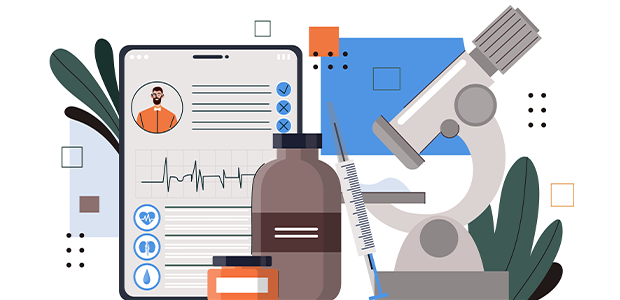
UK public concerned about rushed adoption of AI in personalised medicine
New research indicates that 57% of the UK population fears the rapid adoption of AI in personalised medicine is outpacing the necessary training for safe system use. Additionally, 49% are worried about health data protection in this context.
QBE, a business insurer, surveyed 2,000 UK residents about their views on AI and personalised medicine, which tailors treatment to patients' genetic makeup, lifestyle, and disease characteristics. Personalised medicine, a burgeoning sector in life sciences, significantly impacts the economy, employing one in 121 people and contributing over £13 billion.
AI's integration into life sciences is notable, with half of the top 50 global pharmaceutical companies partnering with AI firms. The AI in life sciences market is projected to reach $7.09 billion by 2028, growing at a 25.23% CAGR. The UK AI market, valued at £16.8 billion, is expected to soar to £801.6 billion by 2035. The UK ranks third globally in AI, following the US and China, with significant recommendations for its adoption in various sectors.
QBE’s study also found that 36% of respondents are unaware of AI’s role in personalised medicine, and 60% feel uninformed about its swift integration. However, 54% of those informed believe AI will enhance healthcare treatment.
Polling ahead of the General Election shows healthcare and the NHS as the second most important issue for voters, just behind the economy.
Sanofi, a multinational pharmaceutical company, has partnered with biotech firm Exscientia to develop new treatments for cancer and immune system-related diseases. Using Exscientia’s AI-based platform, Sanofi can test drug candidates on human tissue models years before clinical trials. Sanofi also collaborates with Insilico Medicine and Atomwise to accelerate drug development through AI.
Sanofi CEO Paul Hudson says: “It’s clear that we stand at the crossroads of a great expansion in medical discoveries, but to take full advantage of AI, there are several challenges that will greatly impact the pharma industry’s ability to unlock potential. Regional differences in regulation will guide restrictions on where AI can be employed, standards, and what constitutes high-risk applications. Concerns about data quality, security, privacy, and trustworthiness have all threatened to slow the uptake of AI. Alliances and organizations are emerging to help companies self-regulate. Strong data foundations and governance will be critical to prevent vulnerabilities as many companies move to operationalize AI across their enterprises.”
Vivan Therapeutics uses AI for personalised cancer treatments. Its TuMatch software can match a colorectal cancer patient’s unique tumour profile with an appropriate drug therapy. It replicates a patient’s genetic profile and can screen thousands of drug combinations for a treatment that’s tailored to them.
Vivan Therapeutics CEO Laura Towart says: “AI has the capacity to significantly enhance the precision and effectiveness of personalised medicine. By analysing vast amounts of data, AI can help tailor treatments to individual patients, improve outcomes and reduce side effects.”
Towart continues, “It is essential that we educate the public about the benefits and safeguards associated with AI in personalised medicine. Our goal is to build trust by demonstrating the value and safety of AI technologies.”
QBE Europe’s Portfolio Manager Life Sciences Tim Galloway says: “While AI holds great promise for enhancing personalised medicine and the life sciences industry, we must proceed with caution. Continuous review of AI systems is vital to identify and rectify any glitches that could jeopardise patient safety. Substantial training programs are necessary to ensure that healthcare professionals are proficient in using AI technologies correctly. AI will likely become a key aspect of risk management in life sciences, particularly around patient centricity.”
Galloway adds, “By advocating for stringent risk mitigation strategies, patients will be better protected and help AI technologies deliver without unintended consequences. Navigating these uncharted waters will be challenging, requiring life sciences companies and professionals to embrace innovation while maintaining ethical, safety, and regulatory standards.”
Likely benefits of AI integration in life sciences include:
- Drug discovery and development
- Genomics and personalised medicine
- Medical device customisation
- Imaging and diagnostics
- Clinical trials
- Drug repurposing
- Regulatory compliance
- Biotechnology
- Healthcare management
Areas of risk of the rapid adoption of AI in life sciences include:
- No consolidated standards yet
- Training gaps
- Human risk
- Data privacy and security
- Medical device failure
Key findings from the research include:
- 57% of respondents are concerned about AI systems being adopted into personalised medicine too quickly to allow for the necessary training to be able to properly use these systems safely, 17% are not concerned
- 57% of respondents are worried that AI is being integrated too rapidly for necessary training and safe use
- 49% of respondents are concerned by the introduction of AI into personalised medicine when it comes to protecting their personal health data, 23% are not concerned
- At the point of polling, 34% respondents had heard or seen anything about the rapid adoption and integration of AI into personalised medicine, 60% had not
- 35% of respondents believe AI in personalised medicine is currently improving healthcare treatment, 11% believe it worsens it and 36% are unaware of its use. Of the people that are informed, 54% think AI in personalised medicine will improve healthcare treatment.

